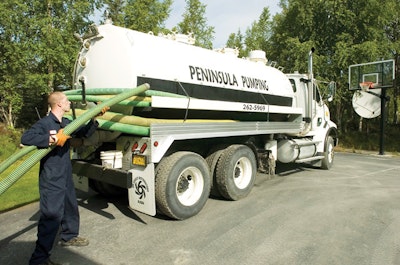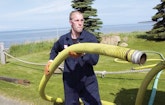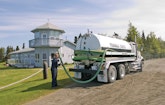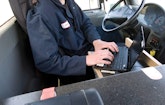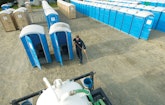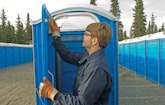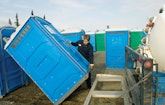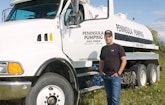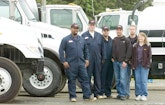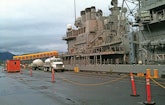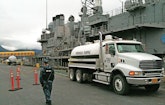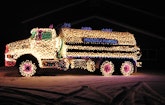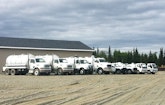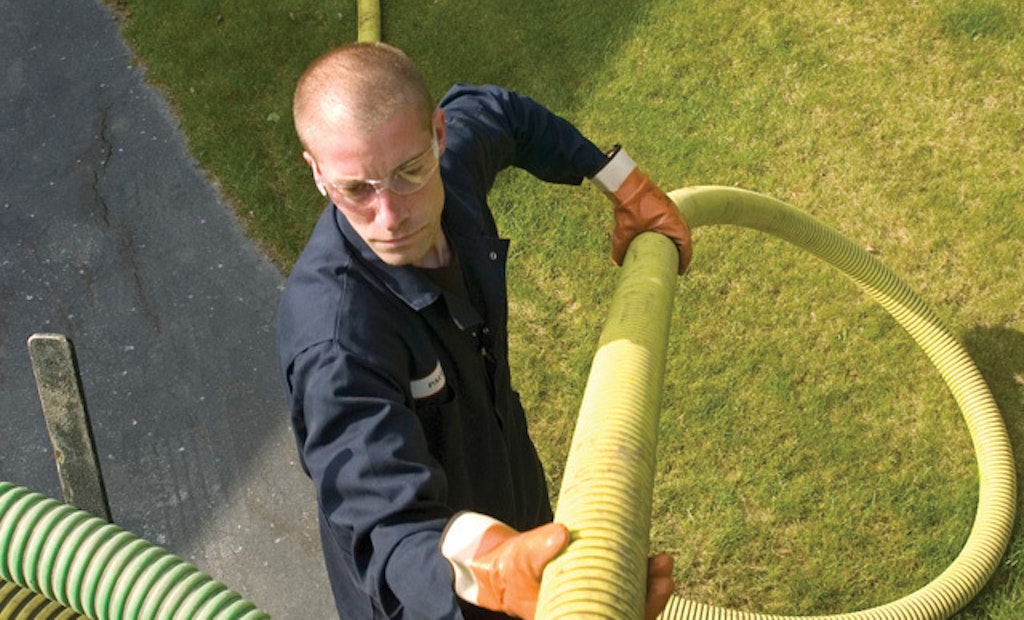Interested in Portable Sanitation?
Get Portable Sanitation articles, news and videos right in your inbox! Sign up now.
Portable Sanitation + Get AlertsWith its frigid, unforgiving winters, rugged, rough terrain and array of unique and seasonal industries – think everything from oil refineries to sport-fishing tourism – running a septic service company in Alaska takes a certain kind of person: scrappy. It’s a word that aptly describes Sean Cude.
Having started down the entrepreneurial path by purchasing an RV park, Cude took some educated business gambles over the years and transformed that initially meager investment into a $1.5 million business, Peninsula Pumping, which provides septic service, installation and portable sanitation in a 100-mile radius of Soldotna, Alaska. Cude is also part owner of a construction business.
Despite the elements, the wear and tear on trucks and equipment, and a multitude of other challenges to overcome, Cude has found the pumping business to be a profitable venture.
SEASONAL SWINGS
Sparse and spread-out populations don’t easily lend themselves to specialization; therefore, Cude’s approach is to take business anywhere he can get it – and turn down almost nothing.
The company offers septic pumping, system installation and repair services to residential, commercial and industrial customers, and has a 400-unit portable restroom inventory. Peninsula Pumping services everything from the tourism industry to oil fields, and from commercial fishing to canneries. In July, the company even supplies portable restrooms and pumping to multitudes of salmon fisherman on the beach. Not surprisingly, the very condensed summer season is when most of the action occurs.
“In Alaska, you basically make 75 percent of your income in a four- to five-month period,” Cude explains. “It’s hard to pump someone’s septic when the pipes are under four or five feet of snow.” Therefore, Alaskan businesses must make hay when the sun shines, as the saying goes.
“I’ll run four or five pumpers in the summer and only two in the winter. I’ll also go from four to two toilet guys.”
Employees might work 80 hours a week during the summer, then only 20 in the winter, when average high temperatures don’t exceed the 20s. During the slow winters, Cude finds ways to keep employees busy so they don’t leave his company in search of more hours. He puts them to work cleaning, painting or maintaining equipment. “We try not to lay anyone off,” he says.
For good reason: employee skill, knowledge and background about the customers and conditions are highly valued. Quality service isn’t just about learning how to pump – it’s about knowing the ins and outs of local industries and service routes.
“We have very little turnover in our crew. We’re very family oriented, and I expect a lot – but I give a lot. That’s why I want to keep them year-round.”
Cude acknowledges the skills of his office crew. Susan Rozar, the office manager, has been with the company 12 years; Paul Schwenk, pumping supervisor, has been with the company seven years; and dispatcher Robin Fritz has been with the company two years. The office administrator is Joleen Farebrother, and she assists Fritz with dispatching, especially in summer.
“The great thing I’ve got going for me is that the office management treats the business like it’s their own. Between the three of them, they manage the crew very well.”
FAR AND AWAY
Another challenge to running a business in Alaska is getting what you need when you need it in the way of supplies, trucks and equipment. When you’re far north of the lower 48 states, added costs and logistical issues are a constant.
“It changes who you buy things from,” Cude explains. “Sometimes you just don’t have a choice. You can’t buy from Florida when you’re in Alaska. If you need something, you have to plan ahead or pay dearly to have it shipped here.”
And you have to do your research. When Cude ordered 15 handicap portable restrooms shipped from Indiana in April, his delivery cost alone was $4,500. Yet this was $450 less than it would have been to ship them from California, his sales representative told him.
To stay a step ahead, Cude stocks up on hoses, fittings and chemicals and tries to buy in bulk. If something breaks, or you run out of it, you can’t have it delivered overnight, he explains. Cude says that by buying in bulk, and shipping from the West Coast or Seattle by truck, air or boat, he often gets better prices than local distributors offer.
ROLLING OFFICES
Efficient use of human resources can make the difference between turning a profit and operating in the red. When Cude noticed wasted time with drivers waiting on the side of the road for customers or the next dispatch, he decided in early 2009 to invest in a dispatch, routing and scheduling software program called Smart Service, a product of My Service Depot (myservicedepot.com). Initially, the program was purchased for the office and dispatching, but a year later the company upgraded to the FLEET version, which allows drivers to receive work orders in their trucks.
“We have actually taken all of our septic trucks and removed the passenger seat and built desks in them,” Cude explains. Each truck is equipped with a laptop and wireless card and is connected to the company’s server. The dispatcher sends text messages and the drivers then pull up the work orders on their computers.
“It’s been a phenomenal improvement,” Cude says. “The total cost of the software, hardware, training and truck modifications was $30,000, but we saved that much last year alone.”
Dispatchers can now see where drivers are at all times, if they’ve arrived or left a jobsite, and can reassign them as needed so most everyone ends their day around the same time. Assignments are streamlined so drivers don’t have to wait around for their next instruction. “It’s solved a whole lot of problems with efficiency,” Cude adds.
Cude’s fleet includes a 2007 Sterling with 3,800-gallon aluminum tank; two 2005 Sterlings with 4,200-gallon Tri-State Tank (TST) aluminum tanks; a 2003 International with 3,600-gallon tank; a 2007 Sterling 12-yard dump truck; a 2005 Sterling 12-yard dump truck; 2010 Ford F-450 4x4 with a 650-gallon waste/300-gallon freshwater tank; a 2009 Ford F-550 4x4 with 650-gallon waste/300-gallon freshwater tank; two 2005 GMC 5500s with 650-gallon waste/300-gallon freshwater tanks; 1999 3,600-gallon pup trailer; 2004 John Deere 160 excavator; 2006 Case skid-steer with tracks.
Peninsula Pumping employees built out the vacuum trucks and the pup trailer in-house, using Masport HXL400WV on all large septic pump trucks. The tanks were bought second-hand and custom-built in Alaska. The GMC portable restroom trucks have Coleman pumps, and the two Ford portable restroom trucks have Masport pumps.
The company’s restroom inventory includes 450 standard restrooms, mostly PolyJohn Enterprises Corp. PJ3 units and Satellite Industries Inc. Tufway models, and 50 handicap restrooms from the same makers.
EQUIPMENT MAINTENANCE IS KEY
In sparsely populated Alaska, businesses have to go where the customers are, and that can mean driving up to 150 miles a day, sharing the roads with huge RVs and other tourist traffic.
“Alaska is hard on trucks and equipment,” Cude explains. “We’ve got 10,000 feet of space to keep the trucks inside and maintained. I like to get them in weekly and get them washed and greased – we have a good maintenance program.”
Tires are changed out, winter or summer, and the portable restroom trucks have four-wheel drive to handle snow and slick conditions. And for the past few years, Peninsula Pumping has added studded tires to its septic trucks. They also keep tire chains on the trucks that they can use on especially weather-challenged days.
Yet, despite the occasionally treacherous conditions, rarely does weather interfere with daily routes. “We don’t let weather – unless it’s freezing rain – stop us or slow us down,’’ Cude says. “Maybe three or four days a year we pull the trucks because it’s unsafe, but we’ve never had any major accidents.”
While most business gets done in the summer, there is still emergency work in the winter; and during winter, the ground can freeze to eight feet down. “You have to dig through the frost – you’re basically breaking chunks out of the ground,” he says. “We try not to do that during the wintertime if we don’t have to,” he adds. “It’s hard on the equipment and costly to the customer. And it’s hard to bid something like that because you just don’t know.
And in the bitter winter, everything’s just slower. “A truck that would do seven or eight pumps in the summertime might only do four or five in the winter. You’re tromping through people’s back yards with snow.”
FOUR-LEGGED OBSTACLES
It may seem a bit odd to learn that, in a state full of black bears, brown bears and moose, the biggest threat to Cude’s employees has historically been what’s supposed to be man’s best friend: dogs.
“People tend to have a lot of dogs,” Cude says. And they’re not on leashes or in the house. They’re protecting back yards from bears, critters and an occasional septic pump truck driver. “I’ve been bitten by a dog – so have some of my drivers,” he says.
Luckily, the Peninsula Pumping crew has never had a run-in with a bear, despite some of the work they do near rivers and campgrounds. But, one driver did hit a moose with a vacuum truck.
“It’s like hitting a cow – took the whole front end off the truck,” he recalls.
Despite the challenges, and the – shall we say – obstacles, Cude says he wouldn’t trade living and working in Alaska for anything.
“We have a great business – a phenomenal business. We get to do some really neat things. Alaska just has a lot of difficult elements that are unique that you’d see nowhere else. You have to be able to adapt to situations to do well.”
Cude has done just that.
